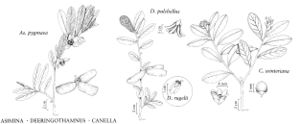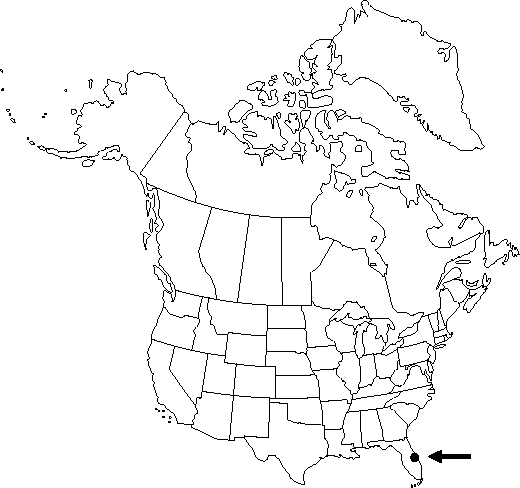Difference between revisions of "Deeringothamnus rugelii"
Addisonia 15: 17, plate 489. 1930.
FNA>Volume Importer |
imported>Volume Importer |
||
| (6 intermediate revisions by 2 users not shown) | |||
| Line 16: | Line 16: | ||
}}{{Treatment/ID/Special_status | }}{{Treatment/ID/Special_status | ||
|code=F | |code=F | ||
| − | |label= | + | |label=Illustrated |
}} | }} | ||
| − | |basionyms={{Treatment/ID/ | + | |basionyms={{Treatment/ID/Basionym |
|name=Asimina rugelii | |name=Asimina rugelii | ||
|authority=B. L. Robinson | |authority=B. L. Robinson | ||
| + | |rank=species | ||
| + | |publication_title=in A. Gray et al., Syn. Fl. N. Amer. | ||
| + | |publication_place=1(1): 465. 1897 | ||
}} | }} | ||
|synonyms= | |synonyms= | ||
| Line 38: | Line 41: | ||
|distribution=Fla. | |distribution=Fla. | ||
|discussion=<p>Of conservation concern.</p><!-- | |discussion=<p>Of conservation concern.</p><!-- | ||
| − | --><p>Deeringothamnus rugelii commonly associates with both Asimina pygmaea and A. reticulata, and overlaps in flowering time with both. No hybrids between the two genera had been observed until a recent discovery of a putative hybrid between D. rugelii and Asimina reticulata by Dr. E. Norman (pers. comm. 1994).</p> | + | --><p><i>Deeringothamnus rugelii</i> commonly associates with both <i>Asimina pygmaea</i> and <i>A. reticulata</i>, and overlaps in flowering time with both. No hybrids between the two genera had been observed until a recent discovery of a putative hybrid between <i>D. rugelii</i> and <i>Asimina reticulata</i> by Dr. E. Norman (pers. comm. 1994).</p> |
|tables= | |tables= | ||
|references={{Treatment/Reference | |references={{Treatment/Reference | ||
| Line 50: | Line 53: | ||
-->{{#Taxon: | -->{{#Taxon: | ||
name=Deeringothamnus rugelii | name=Deeringothamnus rugelii | ||
| − | |||
|authority=(B. L. Robinson) Small | |authority=(B. L. Robinson) Small | ||
|rank=species | |rank=species | ||
| Line 64: | Line 66: | ||
|publication title=Addisonia | |publication title=Addisonia | ||
|publication year=1930 | |publication year=1930 | ||
| − | |special status=Conservation concern;Endemic; | + | |special status=Conservation concern;Endemic;Illustrated |
| − | |source xml=https:// | + | |source xml=https://bitbucket.org/aafc-mbb/fna-data-curation/src/2e0870ddd59836b60bcf96646a41e87ea5a5943a/coarse_grained_fna_xml/V3/V3_1064.xml |
|genus=Deeringothamnus | |genus=Deeringothamnus | ||
|species=Deeringothamnus rugelii | |species=Deeringothamnus rugelii | ||
Latest revision as of 21:45, 5 November 2020
Leaves: petiole 1-2 mm. Leaf blade oblong to obovate or oblanceolate, 1-7 cm, margins revolute, apex acute to obtuse, broadly rounded, often notched. Inflorescences: peduncle slender, 1-2.5 cm. Flowers spreading-ascending to recurved, canary yellow, rarely purple, faintly fragrant; sepals 2-3, erect or slightly spreading, ovate to oblong, ca. 10 mm, apex acute; petals prevalently 6, ascending to slightly spreading, lance-oblong, ca. 1.5 cm × ca. 3-4 mm; pistils (2-)5(-7), fusiform. Berries 3-6 cm. Seeds 1-1.5 cm, ± compressed laterally.
Phenology: Flowering spring, all year as disturbance reaction.
Habitat: Moist sandy peats of slash pine-palmetto flats, savannas
Elevation: 0-50 m
Discussion
Of conservation concern.
Deeringothamnus rugelii commonly associates with both Asimina pygmaea and A. reticulata, and overlaps in flowering time with both. No hybrids between the two genera had been observed until a recent discovery of a putative hybrid between D. rugelii and Asimina reticulata by Dr. E. Norman (pers. comm. 1994).

